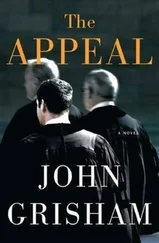The yellow masks, a brilliant idea.
Below the photo there was another story about the bypass. The governor had passed through Strattenburg the day before to rally the troops and push for the project. He had spoken at a Business Forum luncheon and given his usual spiel about how much the area needed the bypass. There was a photo of him mugging for the camera with two of the county commissioners—Mitchell Stak and Lucas Grimes. He called both men “bold leaders” unafraid to make tough decisions.
Staring into the eyes of Mitchell Stak, Theo decided to mail his letter.
He waited until Friday afternoon. He had scoped out a mail drop-off box on a street corner near Gil’s Bike Shop, a place he knew well. It was a typical large, blue metal US Postal Service box with a heavy pull-down slot at the top. As far as Theo could tell, there were no nosy video cameras on any of the nearby buildings.
He had three letters, all identical. The letters themselves were on plain white sheets of copy paper like a million found in every law office. The language had changed little since the original draft. The envelopes were plain white, too, but the wording was different. The return address was from a person who did not exist, a Mr. Toby Clemons, 667 Gorewood Street, Strattenburg. There was no such name in the phone book and no such street in town. Theo decided to use a return address to make the mailing look more authentic. One envelope was addressed to Mr. Stak at his home; another to his hardware store; and the third to the Office of the County Commissioners.
The mail was picked up at 6:00 p.m. each afternoon. At 4:10 Friday, Theo approached the drop box with the three letters in his backpack. He was a nervous wreck. Though he couldn’t pinpoint exactly why, he felt as though he was in the middle of a serious criminal act. For almost a week, he had debated this back and forth, up and down, pros and cons, inside and out, and he had made his decision. What he was doing wasn’t wrong. Maybe it didn’t feel completely right, but it could not get him in trouble. And, most importantly, it might just kill the bypass, and save the Quinn family farm, and keep polluted air away from kids, and so on. Theo was convinced he was right.
Well, he’d been convinced at school, and at the office, and as he rode his bike over to the mailbox, but when he stopped and pulled the letters from his backpack, a voice told him not to do it. “Don’t mail the letters. It’s wrong and you know it. You’re using secret information that you have no right to use. If you were a real lawyer, as opposed to a kid lawyer, you would be violating rules of ethics and could get into serious trouble. Don’t do it, Theo.”
His heart was pounding and his feet were heavy, and Theo knew he should listen to his conscience. The fact that something is not clearly wrong doesn’t mean it’s right. Ike had once told him that in court great lawyers always trust their gut. Right now, Theo’s gut was turning flips.
He shoved the letters into his backpack and hurried away. After half a block, he felt much better. He was breathing, smiling, pedaling furiously, and his backpack weighed far less with the letters still buried inside.
Chapter 27
The last time Theo had been so excited before an event had been the opening day of the Pete Duffy murder trial. Then, his friend Judge Gantry had given Mr. Mount’s class permission to sit in the balcony of his grand courtroom. The crowd had been standing room only—it was, after all, Strattenburg’s biggest murder trial in decades—and Theo and his classmates were lucky to be there.
This, though, was far different. The public hearing was to begin at 8:00 p.m., and two hours before then groups were gathering outside the County Office Building. Near the large front doors, a line was forming of those wanting the best seats. Dozens of protestors with signs walked back and forth on the sidewalk near the street; it seemed as if all were opposed to the bypass. Two television crews were setting up.
When Theo arrived on his bike at 6:30, he met Hardie, Woody, Chase, and April, and they got themselves organized. They found a spot near a monument close to the front of the building, and began handing out yellow surgical masks to anyone who would take one. Hardie’s father had bought a truckload and was there to help. In fact, the entire Quinn family showed up early.
There was a new wrinkle to their protests. April had the idea to include a yellow bandanna with the word TOXIC printed in bold black letters across the center. It was another brilliant move. She and her mother had found the material, and a screen printer donated their services. When properly attired, with yellow surgical mask and matching yellow TOXIC bandanna, each kid looked like a pint-sized terrorist. They soon attracted a crowd as every kid, and quite a few adults, pushed forward to get a free mask and bandanna. One of the TV crews took notice and began filming.
By 7:00 p.m., the small plaza in front of the building was swarming with hundreds of people, many of them kids adorned in yellow from the neck up. Traffic on Main Street was bumper-to-bumper and not moving. The doors finally opened and the crowd began to squeeze inside.
For public meetings, the commissioners met in a large auditorium with high ceilings and tall windows and rows and rows of cushioned seating. Down at the front of the room, the commissioners sat in five huge leather chairs with nameplates and microphones before them on a long table. A small army of aides and assistants were grouped behind them.
When Theo finally managed to get into the room around 7:30, all seats were taken and people were lining up along the walls. He found a spot to stand near the back, and as he took in the surroundings he was astonished at the sea of yellow. Hundreds of kids were there, and every one of them had a mask and a bandanna. Many of their parents did, too.
An administrator of some sort asked the crowd to be quiet. The commission was considering another matter and would appreciate some courtesy. Theo looked down, far away, dead center, and studied the frowning face of Mr. Mitchell Stak. He was the chairman, so he sat in the middle. All five, all white men, looked troubled.
The balcony was opened and soon filled. A fire marshal announced the room had reached its legal capacity and no one else could be admitted. Far across the room, Theo saw his mother. She, of course, could not recognize him because most of his face was covered in yellow and he had the word TOXIC across his forehead, the same as several hundred other kids in the auditorium. Theo waved to her but she did not see him. Mr. Boone was not present.
The commissioners adjourned for a break and disappeared. The crowd bristled with nervous chatter and anticipation. It seemed as though the opponents outnumbered those in favor by at least ten to one, and it was difficult to believe the commissioners would have the guts to go against such a mob. Within a few minutes, the five commissioners returned, took their seats, and stared at the packed house. They were not looking forward to the next three hours.
Mr. Stak pulled his microphone close and said, “Good evening and thanks for coming. It’s always refreshing to see our citizens involved in the issues of the day. We want to hear from you and hope we have enough time. According to our rules of order, we will conduct this public hearing in an orderly and civilized fashion. There will be no cheering, applauding, booing, hissing, or yelling. No form of public protest, other than what is available here at the podium. We will begin with the formal presentation of this project, commonly known as the Red Creek Bypass, and this will be done by various representatives from the State Highway Department. We, the commissioners, will have the chance to ask questions and lead a discussion. Following that, and time permitting, we will hear from our concerned citizens.”
Читать дальше












